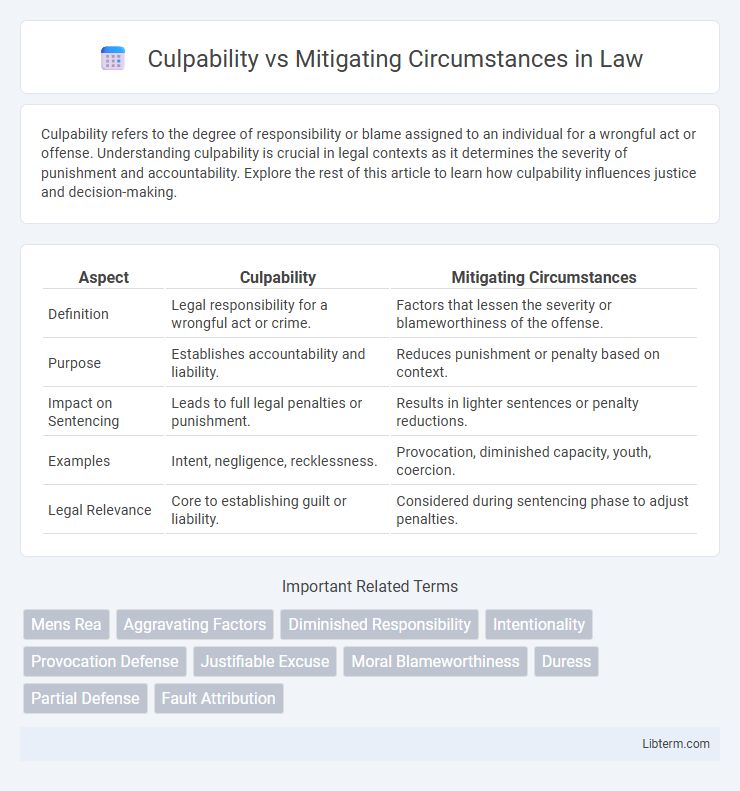Culpability refers to the degree of responsibility or blame assigned to an individual for a wrongful act or offense. Understanding culpability is crucial in legal contexts as it determines the severity of punishment and accountability. Explore the rest of this article to learn how culpability influences justice and decision-making.
Table of Comparison
| Aspect | Culpability | Mitigating Circumstances |
|---|---|---|
| Definition | Legal responsibility for a wrongful act or crime. | Factors that lessen the severity or blameworthiness of the offense. |
| Purpose | Establishes accountability and liability. | Reduces punishment or penalty based on context. |
| Impact on Sentencing | Leads to full legal penalties or punishment. | Results in lighter sentences or penalty reductions. |
| Examples | Intent, negligence, recklessness. | Provocation, diminished capacity, youth, coercion. |
| Legal Relevance | Core to establishing guilt or liability. | Considered during sentencing phase to adjust penalties. |
Understanding Culpability in Legal Contexts
Culpability in legal contexts refers to the degree of blameworthiness or responsibility a defendant holds for a criminal act, which influences the severity of charges and sentencing. It involves assessing intent, knowledge, recklessness, or negligence in the commission of the offense to determine moral and legal guilt. Understanding culpability is crucial for distinguishing between offenses and tailoring appropriate penalties based on the individual's mental state and involvement.
Defining Mitigating Circumstances
Mitigating circumstances refer to factors or conditions surrounding a defendant's actions that reduce their blameworthiness or culpability, potentially leading to lesser charges or lighter sentences. These conditions include mental illness, lack of prior criminal history, duress, or provocation, which do not excuse the crime but provide context for reduced legal responsibility. Understanding mitigating circumstances is crucial in criminal law as they influence judicial discretion during sentencing and legal outcomes.
Key Differences: Culpability vs Mitigating Circumstances
Culpability refers to the degree of blame or responsibility assigned to a person for a wrongful act, often influencing the severity of legal consequences. Mitigating circumstances are factors or conditions that reduce the severity or culpability of the offense, potentially lessening punishment. The key difference lies in culpability assessing the defendant's fault, while mitigating circumstances provide context that may justify a reduced sentence.
Legal Standards for Assessing Culpability
Legal standards for assessing culpability center on determining an individual's level of intent and knowledge regarding a criminal act, often categorized into degrees such as negligence, recklessness, knowledge, and purpose. Courts evaluate mental state through doctrines like mens rea, which establishes the requisite criminal intent necessary for conviction. Mitigating circumstances influence sentencing by reducing perceived blameworthiness, including factors like diminished capacity, lack of prior offenses, or coercion, but do not absolve legal responsibility.
Common Types of Mitigating Factors
Common types of mitigating circumstances in criminal law include mental illness, lack of prior criminal history, duress, and minor role in the offense, which can reduce a defendant's culpability and lead to lesser penalties. Courts often consider emotional distress, intoxication, and genuine remorse as key mitigating factors that influence sentencing decisions. These circumstances do not eliminate guilt but provide context that justifies reduced culpability or punishment.
Role of Intent and Motivation in Culpability
Culpability is fundamentally determined by the presence of intent and motivation behind an individual's actions, establishing the degree of moral or legal responsibility. Intent signifies a deliberate choice to engage in prohibited behavior, while motivation provides the underlying reason influencing that choice. Understanding intent and motivation is crucial in differentiating culpable acts from those excused or diminished by mitigating circumstances, which may reduce liability without negating intent entirely.
How Mitigating Circumstances Influence Sentencing
Mitigating circumstances significantly influence sentencing by reducing the perceived culpability of the defendant, leading to lighter penalties or alternative punishments. Factors such as mental illness, lack of prior criminal record, or duress can diminish moral blameworthiness and justify leniency in judicial decisions. Courts weigh these circumstances to balance justice with fairness, often resulting in reduced sentences or probation instead of incarceration.
Case Studies: Application in Real-World Scenarios
Case studies highlight the distinction between culpability and mitigating circumstances by examining how courts assess intent and external factors influencing criminal behavior. For example, in the landmark case of R v. Cunningham, the court differentiated recklessness from negligence, impacting culpability determinations. Real-world applications demonstrate that mitigating circumstances, such as mental illness or duress, often reduce sentencing severity despite established guilt, emphasizing the nuanced evaluation in judicial decisions.
Challenges in Balancing Justice and Compassion
Culpability determines the degree of responsibility a defendant holds for a crime, while mitigating circumstances can reduce the severity of punishment by highlighting factors like mental illness or coercion. The challenge lies in accurately assessing culpability without disregarding real human complexities, ensuring justice respects both legal standards and compassionate understanding. Balancing these elements requires careful judicial discretion to avoid overly harsh penalties or unwarranted leniency, striving for equity in sentencing.
Evolving Legal Perspectives on Accountability and Leniency
Culpability defines the degree of responsibility a defendant holds for a criminal act, influencing the severity of punishment under evolving legal standards. Mitigating circumstances, such as lack of intent or mental incapacity, serve to reduce culpability by providing context that lessens moral blameworthiness and legal penalty. Contemporary legal frameworks increasingly balance strict accountability with tailored leniency, reflecting nuanced assessments of individual situations to promote fairness in sentencing.
Culpability Infographic

 libterm.com
libterm.com